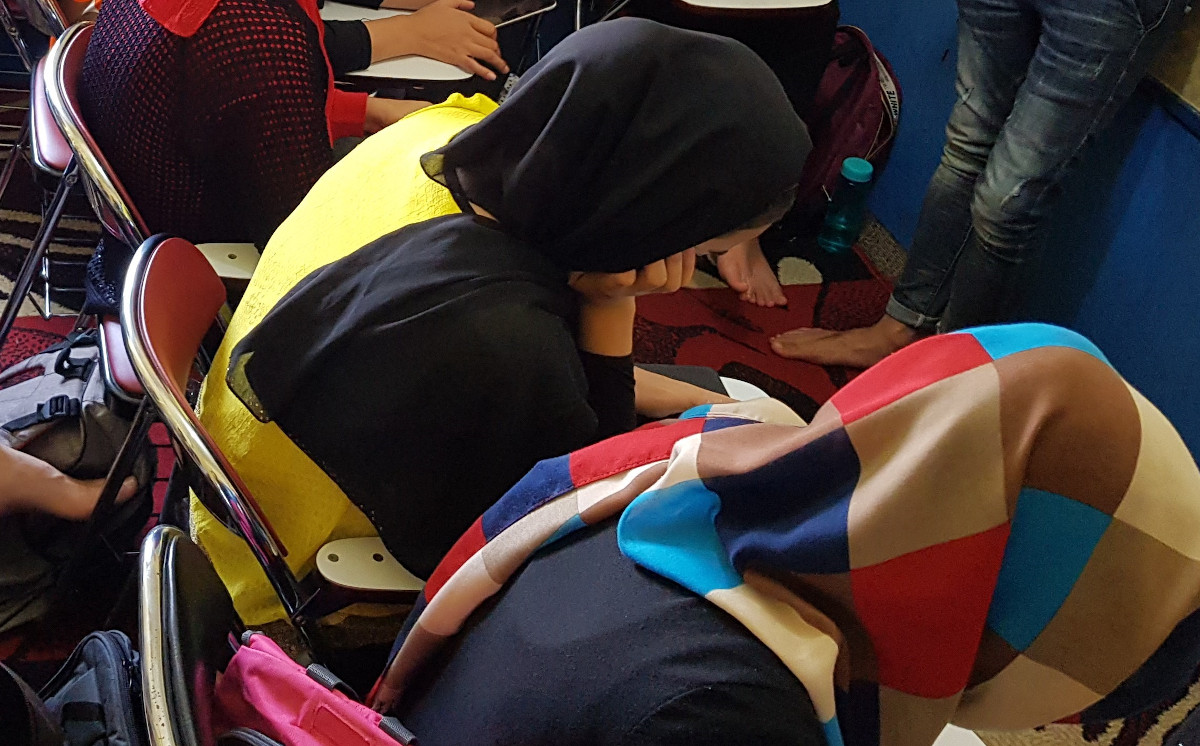 Fatimeh (not a real name) is a refugee from Afghanistan. She and her family arrived in Indonesia about five years ago. She relates her story to Fransica Asmiarsi, Program Manager of JRS Indonesia, of how JRS helped her and her family overcome hardship and depression.
Fatimeh (not a real name) is a refugee from Afghanistan. She and her family arrived in Indonesia about five years ago. She relates her story to Fransica Asmiarsi, Program Manager of JRS Indonesia, of how JRS helped her and her family overcome hardship and depression.
I had a lot of problems before Jesuit Refugee Service (JRS) helped us. I didn’t have medicine because the medicine from Afghanistan is not too good. I was sick and always at home. At night I could not sleep. When I closed my eyes, I would feel like someone had given me an electric shock. It was frustrating for me: I could not go to school; my relations with other people was very bad; I was very nervous. When I went outside, I didn’t talk. When mother spoke to me, I broke a glass. I felt something was missing. I asked what should I do?
There were 11 of us in the house. Besides myself, my brother Isa and my mother are also sick. We tried to control my brother with medicine. He would take up to three tablets at night, but he still could not sleep. All night he would be walking. When Isa didn’t sleep, we all didn’t sleep. In the morning or afternoon, he would fight with us, break glasses, destroy our window or door, or beat me or my niece. Only my big brother could control him. Once Isa held a knife to me.
Then the JRS team came and discussed our problems, and started helping us. They helped move us to another house, and helped me and my brother see a doctor. We felt that time that we are human; we could live our lives like human beings. It made us happy. I started taking medicine and every month I would go to see the doctor for a checkup. Whatever the cost, expensive or not, JRS helped us every time. I am very happy. At first when I went to see the doctor, my condition was very bad. After sometime when I heard that I was normal again, I became happy and I said I will always take my medicine. The next time I went, the doctor said I was already well.
Now I can sleep better at night and can do normal activities. Because of JRS I became active and my life got better. I can go to school and teach in the centre. We have classes four days a week and I can help students who are also refugees and poor like me. We need to help each other. My English is not good but I can help children as much as I can. When I teach them, I also learn. When I learn, they also learn. I feel very happy. When I go to school, I feel like a very strong and active girl.
My relationship with other people also improved because I feel better at school and everywhere. I am able to speak with teachers and students, unlike before. Everyone who knows me are happy to be with me. They want to play with me. Students like their teacher to play with them so I play football and volleyball with the students. Whenever I am free, many people invite me to play with them.
My relationship with my family has gotten better. Although a lot of the time I am outside, so I don’t see them much. I leave home at 7:30 in the morning and come back at 4 or 6 at night. Often from school I go to my friend’s house. When I come home my mother would say that I should just camp outside since I enjoy being outdoors.
Staying at home makes me sad. I don’t even want to brush my teeth. The doctor said I have depression. A person who has depression must leave the place that makes them feel alone and go somewhere they can talk to people. To be happy is good for my health. At home I just sleep, not doing anything. I am very sad, but when I am at school, I am active.
Becoming healthy has been the most important change for me. In the past, Isa’s and my condition was very bad. I did not do anything at home except to sleep, while Isa beat things and people. He doesn’t want to be like that. Our medicines help us very much.
If I don’t take my medicine, I will think a lot at night and feel like someone gave me an electric shock. I won’t be able to sleep. My eyes become painful and I get a headache. I cannot study and go to the centre. Children like a teacher who speaks kindly to them. They want to study in the class and be happy. If I don’t have medicine, I cannot control myself. If I cannot control myself, how can I teach them? If Isa doesn’t have medicine, he could kill us. Our home will not be safe.
I am very thankful to JRS for helping me and my family in our finances and our health. The school doesn’t give me any money, but that is not important. What is important is I am able to go there, teach, learn, and play. At least we, refugees, can be happy with each other. In our situation, being happy is sometimes impossible, so we must keep ourselves busy.
I hope people will continue helping us in the future.

